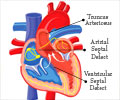Histamine agonist drug stops further damage in a mouse model from heart and kidney dysfunction.

In a new study published in Proceedings of the National Academy of Sciences, a University of Tsukuba research team investigated the levels of histamine, an important factor in inflammation, in mice with cardiorenal damage, and found that histamine was increased in the blood of these mice, compared with normal mice.
Heart failure is a condition in which the heart cannot pump sufficient blood to meet the body's needs, which is often demonstrated by shortness of breath, excessive fatigue, and leg swelling. Chronic kidney disease involves gradual loss of kidney function, frequently characterized by leg swelling, fatigue, vomiting, loss of appetite, and confusion.
Despite many efforts to control these two disorders, treatments for both largely involve modifications of blood vessels to mitigate their effects, rather than curative approaches to reduce the underlying disease processes.
"Histamine is an important factor in various inflammatory processes, and its inhibition generally leads to better disease control," says Akiyoshi Fukamizu, corresponding author on the study. "We found elevated levels of histamine in a mouse model of cardiorenal syndrome, which were surprisingly protective against further damage in these mice."
In the study, mice that could not produce histamine showed worse cardiorenal damage effects, including increased heart size, altered cardiac contractility, and poor urinary filtration. Similar effects were observed when a specific histamine receptor (H3) antagonist was administered to mice with cardiorenal damage, suggesting that this receptor may serve as a useful drug target.
Advertisement
In addition to their finding that histamine can control the severity of cardiorenal syndrome in a mouse model, the researchers showed that activation of a specific histamine receptor could alleviate signs of cardiorenal damage in these mice, providing a new potential treatment for patients with heart failure and patients with chronic kidney disease.
Advertisement















